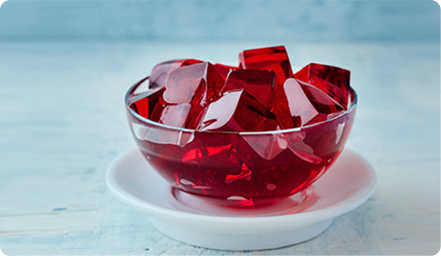-
July, 26,2025
Understanding the Role of Bloom Strength in Soft Gelatin Capsules
-
July, 25,2025
Bloom Strength and Its Impact on Hard Gelatin Capsules
-
July, 21,2025
How Gelatin Is Revolutionizing Pet Food: A Healthier Option for Dogs
-
June, 22,2025
Collagen as a Trusted Ingredient: Meeting Global Demand with Reliable Supply
Is Bovine Gelatin Used in Making Yogurt? A Functional Ingredient in Modern Dairy Production
Wondering if bovine gelatin is used in yogurt—and why? This expert guide breaks down its role, benefits, and what it means for vegetarians, Halal/Kosher diets, and clean-label products. Learn how top yogurt brands choose the right gelatin supplier to meet modern demands.
Is Bovine Gelatin Used in Making Yogurt? A Functional Ingredient in Modern Dairy Production
Is bovine gelatin used in yogurt? The answer may surprise you. In this article, we explore how it’s used, why manufacturers rely on it, and what it means for consumers with dietary or ethical concerns.
Understanding Bovine Gelatin
What Is Bovine Gelatin Made From?
Bovine gelatin is a natural, protein-based substance derived from the collagen of cow hides and bones. Through a controlled process involving hydrolysis, this collagen is converted into a water-soluble form known as gelatin. As a result of its origin, bovine gelatin is classified as an animal-based, edible additive widely accepted in the food industry for its purity and performance.
As a leading gelatin manufacturer, FNP Gelatin supplies bovine edible gelatin in grades specifically designed for food use, especially in dairy products. Unlike technical or industrial gelatin, bovine gelatin used in food must meet stringent purity and safety requirements, making the sourcing and certification process critical.
Key Functional Properties in Food Processing
Bovine gelatin is favored in food applications for several functional reasons:
- Gelling agent – Forms stable gels even at low concentrations.
- Stabilizer – Prevents separation and maintains product consistency.
- Thickener – Enhances the mouthfeel in dairy products like yogurt.
- Foam formation – Useful in whipped or aerated textures.
These properties make it indispensable in modern food processing, especially when clean label alternatives to synthetic thickeners are desired. As a trusted edible gelatin manufacturer, FNP Gelatin ensures all of its products are optimized for consistency and performance in food applications.
Differences Between Bovine and Other Gelatin Types
While gelatin can also be sourced from pigs (porcine gelatin) or fish (marine gelatin), bovine gelatin is the preferred choice in many food systems due to its:
- Neutral taste and color
- Wide acceptance in Halal and Kosher markets (with proper certification)
- Strong gel-forming ability
FNP Gelatin offers both bovine and pork edible-grade gelatin, depending on regional market needs and customer requirements, ensuring full focus on food-grade applications.
Why Yogurt Manufacturers Use Gelatin
Role of Gelatin in Yogurt Texture and Mouthfeel
Gelatin plays a crucial role in delivering the smooth, creamy texture consumers expect from modern yogurt products. When added to yogurt, bovine gelatin helps:
- Prevent whey separation (known as syneresis)
- Create a firmer, spoonable consistency
- Enhance mouthfeel without adding fat or sugar
These textural improvements are particularly important in low-fat and fruit-flavored yogurts, where natural stability is often compromised. As an experienced gelatin supplier, FNP Gelatin provides solutions tailored to these functional needs, ensuring consistent results across various yogurt formulations.
Stabilization and Shelf Life Enhancement
In addition to improving texture, bovine gelatin contributes to the stabilization of yogurt throughout its shelf life. It helps maintain emulsion integrity and prevents ingredient separation during distribution and storage. This is especially vital in refrigerated supply chains where product appearance and texture impact consumer perception and brand trust.
Many yogurt manufacturers rely on a consistent edible gelatin supplier to provide materials that meet food-grade safety standards, offer batch-to-batch consistency, and ensure long-term stability — all of which are key strengths of FNP Gelatin's dairy-grade products.
Gelatin vs Pectin vs Starch: Functional Comparison
While other stabilizers, such as pectin or starc,h are also used in yogurt production, gelatin offers unique advantages:
|
Property |
Gelatin |
Pectin |
Starch |
|
Source |
Animal (bovine/pork) |
Plant-based (fruit) |
Plant-based (corn, potato) |
|
Texture Outcome |
Smooth, creamy, elastic |
Gel-like, slightly watery |
Thick but sometimes grainy |
|
Heat Stability |
High |
Moderate |
Low |
|
Gelation Type |
Thermoreversible |
Irreversible |
Thickens only with heat |
For brands targeting premium yogurt markets — especially those producing set-style yogurts or drinkable yogurts — gelatin remains the superior option for stability, clean mouthfeel, and performance.
As a trusted edible gelatin manufacturer, FNP Gelatin collaborates with dairy processors to provide gelatin solutions that align with their formulation goals and clean-label aspirations.
Is Bovine Gelatin Commonly Found in Yogurt?
Types of Yogurt That Typically Contain Gelatin
Not all yogurt products include gelatin, but many commercial brands incorporate bovine gelatin to improve texture and shelf stability, especially in:
- Low-fat or non-fat yogurts, where natural milk fat is removed
- Flavored or fruit-on-the-bottom yogurts, which need stabilization
- Set yogurts, which require firmness and a clean structure
- Drinkable yogurts, where the suspension of solids and smooth flow are key
In these applications, gelatin helps manufacturers meet consumer expectations for consistency and visual appeal. As a leading gelatin manufacturer, FNP Gelatin offers food-grade bovine gelatin solutions tailored to these yogurt product types.
How to Identify Gelatin on Ingredient Labels
For consumers concerned with dietary restrictions or ingredient transparency, it's important to read the label carefully. Gelatin is usually listed as:
- "Gelatin"
- "Bovine gelatin" (in some regions)
- Or occasionally under the umbrella term “stabilizer” (less transparent)
In regulated markets like the U.S. and EU, manufacturers are encouraged to specify animal origin for allergens or for religious considerations. Yogurt brands working with a reputable gelatin supplier like FNP Gelatin can access technical documentation and origin certifications to support clean-label declarations and regulatory compliance.
Regional Differences in Gelatin Use in Dairy
Gelatin usage in yogurt varies by region:
- North America & Europe: Widely used, though plant-based alternatives are gaining traction in clean-label or vegan niches.
- Middle East & Southeast Asia: High demand for Halal-certified bovine gelatin, especially in Muslim-majority countries.
- India: Limited due to vegetarian market preference; starches and pectins are more common.
As a global edible gelatin supplier, FNP Gelatin offers both Halal and Kosher certified options to meet diverse regional and cultural needs.
Bovine Gelatin in Yogurt: Vegetarian, Halal & Kosher Concerns
Is Yogurt with Bovine Gelatin Vegetarian-Friendly?
The short answer is: no, bovine gelatin is not suitable for vegetarians. Since it is derived from animal collagen (specifically from cow hides and bones), its use in yogurt excludes the product from vegetarian classification. This is a significant consideration for:
- Lacto-vegetarians, who consume dairy but avoid animal-derived additives
- Consumers seeking plant-based lifestyles, even if not strictly vegan
To accommodate these preferences, some yogurt brands now clearly label whether their products are gelatin-free or use plant-based alternatives such as pectin or agar.
Still, many commercial dairy producers prefer bovine gelatin for its superior gelling behavior, especially when working with a reliable gelatin supplier like FNP Gelatin which ensures ingredient traceability and technical support.
Halal and Kosher Certifications: What’s Required?
Bovine gelatin can be Halal- and Kosher-compliant — but only when it’s produced under certified conditions. For yogurt products to carry these religious certifications, the gelatin used must:
- Be sourced from animals slaughtered according to religious law
- Be processed in certified facilities free from cross-contamination
- Be accompanied by proper documentation and batch traceability
As a certified edible gelatin manufacturer, FNP Gelatin offers both Halal and Kosher bovine gelatin produced to rigorous religious and food safety standards. This enables yogurt producers to confidently label their products for global and religiously observant markets.
Growing Demand for Gelatin-Free and Plant-Based Yogurts
While bovine gelatin continues to be widely used, there is a rising demand for:
- Vegan yogurts made from almond, soy, coconut, or oat milk
- Clean-label yogurts that avoid animal-derived additives
- Gelatin-free dairy yogurts, especially in Western markets
Many of these shifts are driven by younger, label-conscious consumers. However, traditional bovine gelatin remains preferred for high-performance, cost-effective stabilization in dairy. FNP Gelatin works closely with manufacturers to either provide certified gelatin solutions or assist with transitions toward cleaner, alternative formulations, based on client market goals.
Industrial Standards and Regulations
Global Guidelines for Gelatin Use in Dairy Products
The use of gelatin in dairy products, including yogurt, is subject to strict food safety and labeling regulations across major markets:
- United States (FDA): Gelatin is classified as GRAS (Generally Recognized As Safe) for use in food. Ingredient labeling must specify “gelatin,” and origin disclosure is encouraged.
- European Union (EFSA): Food additives, including gelatin, must meet purity criteria. Labeling must reflect origin in sensitive categories.
- China, GCC, Southeast Asia: Regulatory bodies require origin verification and Halal certification for gelatin in yogurt sold in predominantly Muslim markets.
Working with an experienced gelatin manufacturer like FNP Gelatin ensures that all gelatin used in food production complies with local and international food standards, accompanied by certifications.
Clean Label and Additive Transparency
In recent years, the clean label trend has shifted consumer expectations. Yogurt brands are increasingly expected to:
- Minimize the number of additives
- Clearly list natural vs animal-based stabilizers
- Use ingredients recognizable to consumers
For producers who still want the functional benefits of gelatin while aligning with clean-label values, sourcing from a certified edible gelatin supplier like FNP Gelatin allows for:
- Use of food-grade gelatin only
- Transparent supply chain documentation
- Customizable gel strength to reduce dosage while maintaining function
B2B Expectations from Gelatin Suppliers
For yogurt manufacturers and food processors, the choice of gelatin supplier goes beyond cost — it’s about reliability, compliance, and product consistency. Key B2B expectations include:
- Stable gelatin bloom grades (to ensure consistent texture)
- Technical formulation support for specific dairy processes
- Certifications: Halal, Kosher, FSSC 22000, ISO, etc.
- Long-term supply assurance
FNP Gelatin meets these expectations by offering tailor-made gelatin grades, robust food safety systems, and dedicated client support teams, making it a preferred partner for dairy brands seeking dependable gelatin solutions.
Choosing the Right Gelatin for Yogurt Applications
Bloom Strength and Thermal Stability Requirements
One of the most critical parameters when selecting gelatin for yogurt is bloom strength — a measure of gel firmness. Yogurt manufacturers typically use:
- 200–250 bloom bovine gelatin for set and spoonable yogurts
- Lower bloom options (150–180) for drinkable or stirred yogurt types
Proper bloom strength ensures:
- Uniform consistency
- Stable gelation at refrigeration temperatures
- Easy dispersion in dairy processing lines
FNP Gelatin, as a specialized gelatin manufacturer, provides multiple bloom grades tailored for dairy applications, helping formulators achieve their desired texture and performance targets.
Compatibility with Cold-Fill and Heat-Treated Yogurts
Yogurt manufacturing varies from cold-fill to heat-treated processes — each with different requirements for gelatin behavior:
|
Process Type |
Gelatin Role |
Key Requirement |
|
Cold-fill yogurt |
Added after fermentation |
Excellent solubility at low temp |
|
Heat-treated yogurt |
Gelatin added before pasteurization/heating |
High thermal stability |
Choosing a gelatin type that matches the processing method is essential to maintain product integrity. FNP Gelatin works closely with dairy R&D teams to recommend or customize gelatin formulations that perform reliably under real manufacturing conditions.
Why FNP Gelatin Is a Trusted Bovine Gelatin Supplier
Edible Gelatin Grades Tailored for Dairy
FNP Gelatin specializes in high-quality, food-grade gelatin solutions engineered for dairy applications, particularly yogurt. Whether you're formulating fruit-flavored yogurt, low-fat options, or drinkable variants, FNP provides:
- Consistent bloom strength across batches
- Optimized viscosity for dairy systems
- Rapid solubility and clean dispersion, even in cold-fill processes
As a dedicated edible gelatin manufacturer, FNP supplies edible grade bovine and pork gelatin, ensuring complete focus on food safety and functional quality.
Halal and Kosher Certified Production Facilities
Global food brands rely on gelatin that meets not only technical criteria but also religious and regulatory standards. FNP Gelatin delivers on both fronts with:
- Halal certification from recognized authorities
- Kosher certification for compliance in key export markets
- Production lines that meet FSSC 22000 and ISO standards
These certifications give yogurt producers confidence that their formulations will be accepted across diverse consumer segments, especially in regions with strict dietary observances.
Customization and Technical Support for Yogurt Brands
FNP Gelatin isn’t just a gelatin supplier — it’s a formulation partner. The company offers:
- Custom bloom strength development for brand-specific textures
- Technical guidance for clean-label transitions or gelatin reduction
- Ongoing support for R&D, sample trials, and manufacturing scale-ups
This level of support helps brands shorten development cycles and bring high-quality, consumer-preferred yogurt products to market faster and more reliably.
Whether you’re launching a new dairy line or reformulating to meet modern consumer trends, FNP Gelatin provides the expertise and materials needed to succeed.
Final Thoughts
Bovine gelatin remains a trusted additive in yogurt manufacturing for its functional benefits, especially in texture, stability, and shelf life. But with growing consumer demand for ingredient transparency and religious or dietary compliance, clarity is more important than ever.
By working with a certified gelatin manufacturer like FNP Gelatin, yogurt brands can access safe, high-quality edible gelatin backed by full traceability, Halal/Kosher certification, and consistent performance, meeting both technical and ethical expectations in today’s dairy market.
Phone: +86-577-88105990
Mobile: +86-138 5886 1938
Official Website: www.fnp-gelatin.com
Email: sales@funingpu.com
Address: No. 1-10 Wenpu Road, Yacheng Town, Xiapu County, Ningde City, Fujian Province




